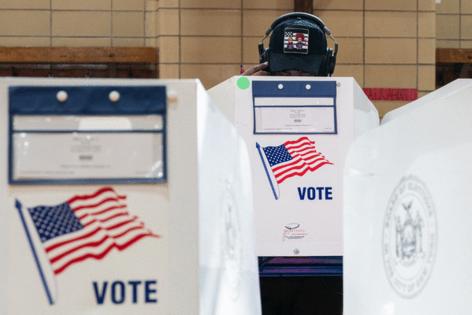Mary Ellen Klas: Abolishing voting by mail will hurt Republicans more than help
Published in Op Eds
If President Donald Trump were to issue an executive order to abolish mail-in voting, as he announced he would on social media on Monday, it would almost certainly be unconstitutional. It would also be baffling — because eliminating vote-by-mail would probably hurt Republicans more than it would help them in next year’s midterm elections.
Trump has been thrashing about for months looking for ways to manipulate the midterms. He is so afraid that Republicans could lose Congress that he persuaded Texas Republicans to conduct a mid-decade redistricting to carve out five additional GOP congressional districts. He ordered the Department of Justice to create a federal database of information on voters, presumably to hunt for illegal voting and serve as a precursor to federal control of state elections. And now he’s attacking the mail-in ballot, which Trump has long claimed, without evidence, cost him the 2020 presidential election.
“Remember, the States are merely an ‘agent’ for the Federal Government in counting and tabulating the votes,” Trump wrote in an error-filled post on Truth Social. Not according to Article 1, Section 4 of the Constitution, which says that election rules “shall be prescribed in each State by the Legislature thereof.” What’s more, the US Supreme Court has ruled that statewide vote-by-mail systems are constitutional, upholding a 1998 ballot initiative that adopted the practice in Oregon.
Trump’s lengthy post also claimed that “Democrats are virtually Unelectable without using this completely disproven Mail-In SCAM. ELECTIONS CAN NEVER BE HONEST WITH MAIL IN BALLOTS/VOTING, and everybody, IN PARTICULAR THE DEMOCRATS, KNOWS THIS.”
Trump is likely responding to the shift in behavior he engineered by denigrating voting by mail after his 2020 loss. For decades, Republicans were the beneficiaries of mail-in balloting, and they encouraged their high-propensity voters to bank their votes early and avoid the risk of bad weather, power outages, technology failures or other major disruptions on Election Day.
The practice began after George W. Bush’s narrow victory over Al Gore in 2000. Republican legislators across the country passed no-excuse absentee voting laws to encourage their voters to cast their votes early. The effort was so successful that when red states were attempting to crack down on alleged voter fraud in the last decade with more stringent voter identification laws, their focus was on in-person and early voting. Republican legislators explicitly exempted mail voters “because they understood that their voters were casting mail ballots more frequently than Democrats and they didn't want to disadvantage themselves,’’ said Michael P. McDonald, a political scientist at the University of Florida.
But Trump has been obsessed with mail-in voting since 2016, when he lost Colorado to Hillary Clinton as that state launched its first all-mail election. State officials delivered a ballot to every registered voter and implemented elaborate safety protocols before votes were tabulated. But Trump concocted a host of conspiracy theories about widespread vote fraud. He amplified those claims across the country when he lost in 2020, and they are now part of Trump’s brand.
In his book on the 2020 election, McDonald breaks down how the Republican mail-in balloting advantage shifted during the pandemic to benefit Democrats. As Democratic-run states were moving to provide safe mail-ballot options, Trump resisted: He didn’t want to admit that the pandemic required such safety precautions. But voters had their own preferences when it came to their own personal safety and, in 2020, a record 43% of all ballots were cast by mail. While the numbers dropped to 30% in 2024, that was still higher than pre-pandemic levels, according to the US Election Assistance Commission.
It's hard to know exactly what Trump intends with his post. Maybe it is directed at blue states such as Colorado, California, Vermont and Washington, where officials deliver ballots to every eligible voter even if they haven’t requested to vote by mail. That would at least make logical sense. At the same time, it doesn’t — a quick look at recent voting history shows how it might backfire.
Republicans benefitted from mail-in voting prior to 2020 because many of their voters were in the military, were business travelers who couldn’t be home to cast in-person ballots, were older White voters, or were voters who lived rural areas where in-person voting was inconvenient, McDonald explained. “If you really wipe out those mail ballots, then you can actually hurt Republicans.”
And while Trump may think that Democrats are voting by mail in higher numbers than Republicans, a data analysis by The New York Times found that despite Trump’s attempt to disparage the practice, Republicans made almost universal gains in mail voting during the 2024 election — including, the report notes, in “battleground states like Pennsylvania, red states like Florida and blue states like Connecticut.”
In his post, Trump says he will “lead a movement” to get rid of mail-in ballots and voting machines that don’t use paper ballots. Those are suggestions worth debating. But if he plans to make it happen by violating the Constitution to interfere with the midterm elections, Republicans should see it as a red flag — as Democrats do. The president isn’t trying to eliminate fraud, or defeat only Democrats. His goal is to consolidate his power.
____
This column reflects the personal views of the author and does not necessarily reflect the opinion of the editorial board or Bloomberg LP and its owners.
Mary Ellen Klas is a politics and policy columnist for Bloomberg Opinion. A former capital bureau chief for the Miami Herald, she has covered politics and government for more than three decades.
©2025 Bloomberg L.P. Visit bloomberg.com/opinion. Distributed by Tribune Content Agency, LLC.
























































Comments